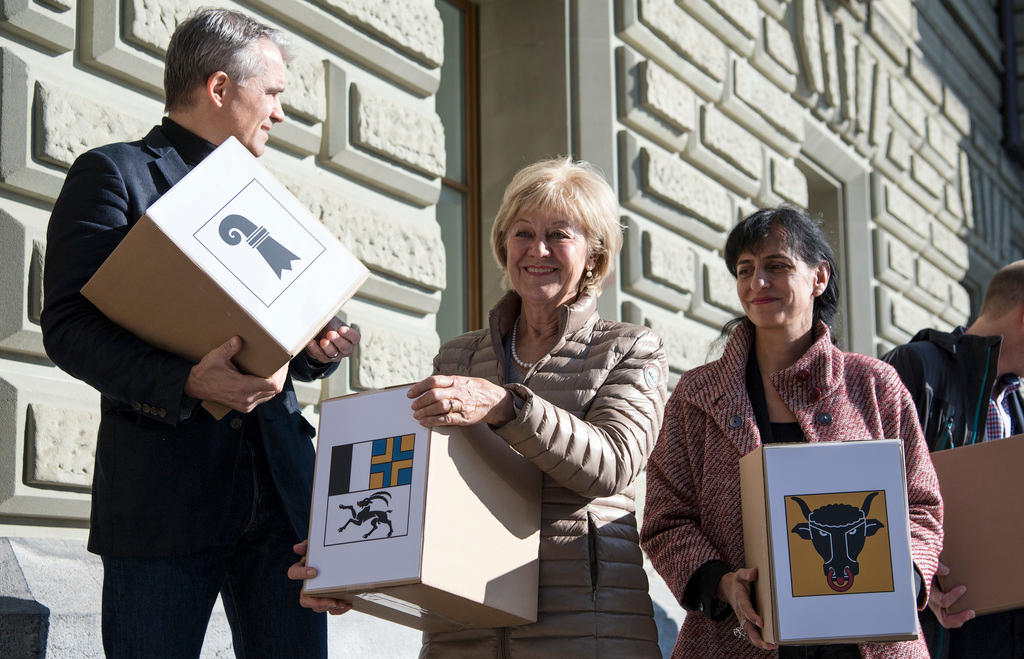Voters to decide on the price of retaining foreign firms

Reforming the Swiss corporate tax code to stamp out corporate abuses is proving anything but simple. In February, voters will decide if parliament has come up with a realistic plan or simply burdened the middle class with the cost of keeping multinationals in Switzerland.
Switzerland competes hard with other countries to attract the regional headquarters of multinational firms. Part of the strategy includes attractive tax rates. But the European Union and the Organisation for Economic Co-operation and Development (OECD) have labelled parts of Switzerland’s tax regime anti-competitive and harmful, forcing more corporate tax reform.
Part of the criticism is that foreign multinationals currently pay less tax on overseas earnings than domestic firms do. It is also too easy for big companies to reduce their bills by artificially moving profits from high tax countries to low tax havens, says the OECD.
Finding a solution, which balances the desire to retain foreign multinationals with the need to keep corporate tax revenues flowing, has taken politicians years to resolve. In June, parliament rubber-stamped a plan to harmonise tax rates for foreign and domestic firms together with new tax breaks on research and development carried out by companies.
Several cantons have announced plans to reduce their headline tax rates while the government has promised to compensate initial revenue shortfalls with subsidies (see box below for details).
Too company friendly
But this plan will leave a gaping hole of CHF2 billion ($1.95 billion) a year in cantonal corporate tax income, according to government estimates. The leftwing Social Democratic Party believes the final deficit to the federation, cantons and communes will be closer to CHF3 billion.
They say this is too high a price to pay for keeping multinationals in Switzerland. Furthermore, they complain that middle class Swiss citizens will be forced to foot the bill for plugging the deficit. The Social Democrats spearheaded a campaign against the new tax regime, which will culminate in a referendum on February 12.
“Only a few large companies and their shareholders will benefit [from the proposed tax changes],” says Social Democrat parliamentarian Susanne Leutenegger Oberholzer. “Their gain will be at the expense of other tax contributors – especially the middle class – who will have to bear a higher tax burden or cuts in services.”
“The Swiss economy is already extremely competitive internationally and should not be supported with additional tax incentives,” she added.
Jobs endangered
But business lobby groups are against the aims of the referendum. The Swiss Business Federation says that parliament’s proposal would conform with international standards and end years of uncertainty for companies. The Association for Small and Medium Sized Enterprises said 300,000 jobs would be endangered if voters torpedo tax reforms.
Rightwing and centre-right politicians are also against the referendum. “The abolition of special tax regimes is not in any way a fiscal gift to maintain our competitiveness as a business location,” said Radical Party parliamentarian Beat Walti. “The new measures will ensure that Switzerland remains attractive for businesses in the future, especially for those active in research and innovation.”
“If we do nothing, there is a danger that many companies will leave Switzerland in the years to come,” he added.
The current proposed corporate tax overhaul is the third such exercise in Switzerland following the 1997 and 2007 reforms.
In this instance, a special tax regime will end for some 24,000 firms (mainly holding, domiciliary and mixed companies) in Switzerland. These enterprises are typically subject to a tax rate of between 7.8% and 12%. The effective rate for other firms ranges between 12% and 24%.
This distinction will be abolished under parliament’s plan. Many cantons have made plans to reduce their headline corporate tax rate to soften the blow for foreign multinationals, but this will leave cantons short of around CHF2 billion in tax receipts.
To make up for this, the government would increase the amount of federal corporate tax income that it distributes to the cantons from 17% to 21.2% – at a cost of CHF920 million. In addition, it would give around CHF180 million to the hardest hit cantons for a period of seven years, to give them time to adjust to the revenue shortfalls.
Parliament’s corporate reforms also foresee tax breaks for company research and development (R&D) – known as patent boxes. This would allow firms to deduct up to 90% of profits derived from patents and similar rights – in addition to tax deducting R&D expenses.

In compliance with the JTI standards
More: SWI swissinfo.ch certified by the Journalism Trust Initiative





You can find an overview of ongoing debates with our journalists here. Please join us!
If you want to start a conversation about a topic raised in this article or want to report factual errors, email us at english@swissinfo.ch.